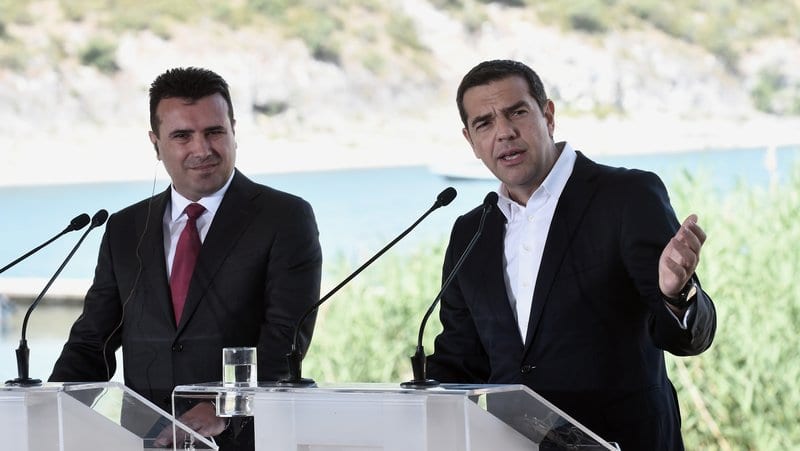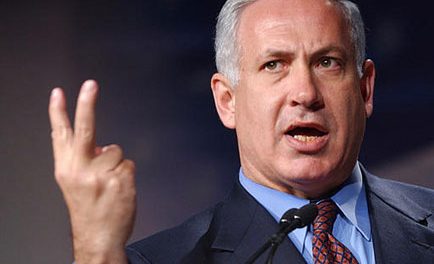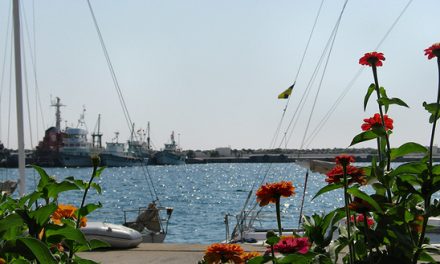By Todd Carney*, Lawfare
The former Republic of Macedonia recently changed its official name to the Northern Republic of Macedonia (or, herein, North Macedonia). This change gives North Macedonia a chance to join the North Atlantic Treaty Organization (NATO), a move that NATO member Greece had blocked until now over objections to the country’s use of the name Macedonia. Despite these steps in the right direction of enabling North Macedonia to join NATO, uncertainty remains.
The History of Macedonia
The name Macedonia traces back to 700 B.C.E. from people who called themselves Macedonians. Starting in 400 B.C.E., the tribe created a kingdom that made up the region of Macedonia and consisted of what today is part of the Balkan Peninsula and part of Greece. From 336 B.C.E to 323 B.C.E., Alexander the Great ruled a Macedonian empire that was considered the greatest of its time. While it passed between different hands, Macedonia remained relatively cohesive for the subsequent two millennia until 1913, when the Balkan War broke out and resulted in Bulgaria, Greece and Serbia dividing up the region. The countries held on to their respective parts of Macedonia through the creation of Yugoslavia, which contained the Serbian part of the region but not the Greek and Bulgarian parts. During World War II, Josip Broz Tito liberated Yugoslavia from German occupation and created the new People’s Republic of Macedonia from the Serbian part of the historical region.
When Yugoslavia disbanded in 1991, the People’s Republic of Macedonia began referring to itself simply as Macedonia. Greece disapproved, as it also had a province called Macedonia that consisted of the part of Greece located in historical Macedonia. Greece feared that the country of Macedonia might try to claim this region or cherished historical figures associated with the area, such as Alexander the Great. As a result, Greece initially blocked Macedonia from joining the United Nations in 1993. Later that year, the two countries worked out a compromise wherein Macedonia would join the United Nations as the Former Yugoslav Republic of Macedonia (FYROM). In 1995 the U.N. built off that compromise and brokered an Interim Accord to regulate relations between Macedonia and Greece, which includeda stipulation that Greece would not block Macedonia from joining an international organization so long as it applied using the name FYROM.
Name Change Negotiations
In 2008, following another spike in name-related tensions, Greece vetoed Macedonia from joining NATO, even though Macedonia applied as FYROM. In response, Macedonia sued Greece in the International Court of Justice (ICJ) on the grounds that Greece’s actions violated the U.N. Interim Accord that Greece could not veto Macedonia from joining an international organization under the name FYROM. As the countries waited for a ruling, the U.N. tried to get Greece and Macedonia to negotiate a name change. The ICJ ruled in Macedonia’s favor that Greece violated the U.N. Interim Accord, but rejected Macedonia’s motion to order Greece not to intervene against Macedonia joining international organizations on the basis that “there is
no reason to suppose that a State whose act or conduct has been declared wrongful by the Court will repeat that act or conduct in the future, since its good faith must be presumed.” So the ruling did nothing to change the circumstances in terms of Macedonia joining NATO.
Nonetheless, negotiations stalled and eventually stopped in 2015. In 2017, however, Macedonia elected a new government that supported working with Greece to find a resolution and allow it to join NATO, leading the new prime minister to restartnegotiations.
In June 2018, this yielded an agreement that would have Macedonia change its name to North Macedonia in exchange for Greece not preventing it from joining NATO. After the deal, NATO formally invited Macedonia to join.
Macedonia’s parliament attempted to pass legislation implementing this name change shortly after the agreement but was blocked by the country’s president, Gjorge Ivanov, who was a member of the opposition. Ultimately, the parliament set a referendum for September over the name change. In September, the majority of the voters who showed up supported changing the name, but the referendum did not prove binding because turnout did not reach the required 50 percent threshold. Macedonia then successfully changed its name in January 2019 with a two-thirds vote in the parliament. Despite his opposition, Ivanov had to sign the name change treaty because under Macedonian law the president has to sign a law passed by two-thirds of the parliament. Greece approved the treaty through its parliament in the same month, after which Macedonia formally changed its name to North Macedonia.
Russia’s Objection
North Macedonia’s gaining a path to join NATO serves as a setback for Russia, which wants to ally with the Balkan countries to counter NATO’s influence in Europe. In the past decade, three other countries of the former Yugoslavia joined NATO despite Russia’s objections: Slovenia, Croatia and Montenegro.
As name change negotiations heated up in the summer of 2018, Russia tried to stop them. Russia provided “trainings” to a small far-right political party in Macedonia to try to build opposition to a name change. In July, after the deal announcement, Greece expelled two Russian diplomats and prevented two other Russian citizens from entering Greece due to evidence that Russia provided support to violent protests and political parties in Macedonia opposed to the name change. Russia responded by canceling a trip its foreign minister planned to take to Greece and expelling two Greek diplomats from Russia.
In September, ahead of the referendum in Macedonia, a flurry of Facebook posts and news sites called for Macedonians to boycott the referendum with the hashtag #Bojkotiram, which means “boycott” in Macedonian. The campaign seemed similar to campaigns that Russia had run in other countries, such as the U.S. The campaigns aimed to prevent the referendum from reaching 50 percent voter turnout, so the referendum would not prove binding. The Transatlantic Commission on Election Integrity found Russia responsible for many of these Internet posts in Macedonia.
Following Macedonia’s ratification of the treaty, Russia claimed the ratification was just another instance of the U.S. exerting its influence over smaller countries. In response, Greece warned Russia not to interfere in Greece’s affairs. The tension between Greece and Russia departed from traditionally cordial relationships between the two countries.
Despite North Macedonia’s and Greece’s completion of the steps necessary for North Macedonia to join NATO, North Macedonia and the U.S. remain concerned that Russia could find a way to prevent the accession of North Macedonia into NATO. Their concern is that Russia could create friction between NATO member states during the 18 months it will take for North Macedonia to formally join NATO, leading a country to veto North Macedonia joining NATO before accession is complete.
The United States and North Macedonia
The U.S. “strongly supports” North Macedonia joining NATO. Last May, U.S. Vice President Mike Pence reached out to the Greek government and encouraged it to continue to negotiate with Macedonia. Ahead of the September 2018 referendum, then-U.S. Defense Secretary James Mattis visited Macedonia to signal U.S. support for the referendum.
During efforts to ratify the name change treaty, the U.S. called out Russia for trying to influence the name change decision in Macedonia. During his visit to Macedonia, Mattis said the U.S. did not want Russia interfering there like it had in other countries by conducting broad “influence campaigns.” Indeed, the U.S. reportedly intercepted the communications that proved Russia supported violent protests in Macedonia and disclosed them to the Greek government, which responded by expelling two Russian diplomats.
Despite this firm support from the U.S., some observers doubt that the Trump administration will remain committed to supporting North Macedonia joining NATO. The concern comes from comments Trump has made about NATO and Montenegro, some of which have seemed to parrot Russia’s views on the subject. Over the summer following his summit with Russian President Vladimir Putin, Trump called NATO “obsolete” and suggested the U.S. could withdraw from NATO. Trump went onto call Montenegro “very aggressive” and suggested that Montenegro could start World War III by attacking another country, which, in Trump’s view, would force all 29 NATO allies to join Montenegro’s attack, under NATO rules.
Many key figures in the U.S. Congress support North Macedonia joining NATO. The chairman and ranking member of the House Committee on Foreign Relations issueda joint letter on Feb. 6 urging the Trump administration to support North Macedonia in joining NATO. Sens. Jeanne Shaheen, D-N.H., and Thom Tillis, R-N.C., who co-chair the Senate NATO Observer Group, have also called for North Macedonia to join NATO. However, other politicians have shown wariness of NATO overall and specifically in regard to North Macedonia joining NATO. In September 2018, Sen. Rand Paul R-Ky. expressed skepticism of Macedonia joining NATO. In 2017, Sen. Mike Lee R-Utah voiced concern about U.S. involvement in Macedonia. These senators were the lone votes against a treaty supporting Montenegro joining NATO.
Despite these objections, a key diplomat in the process, U.S. Deputy Assistant Secretary of State for European and Eurasian Affairs Matthew Palmer, believes North Macedonia will join NATO by mid-2020. At the moment, everything seems on track for North Macedonia to join NATO. But a lot can change in 18 months.
*Todd Carney is a first-year student at Harvard Law School. He holds a Bachelor’s degree in Political Science and Public Communications. He has also worked in digital media in New York City and Washington D.C.



















